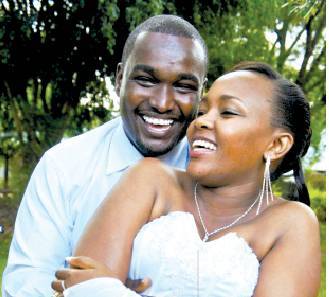When the past comes haunting

An unwanted picture or video from a previous relationship resurfaces all over sudden. Or a baby mama demands support for a child born out of wedlock that your spouse know nothing about… we all have things we regret doing, but what do you do when they catch up with you?
Nailantei Norari @artnorari
Everyone has a past. Some are more colourful than others. One of the prerequisites for a successful relationship is that the people involved reveal parts of their pasts in order for their partners to better understand them.
The process of revealing oneself to a potential is called self-exposure.
But self-exposure has its limitations as people do not reveal bad things they did or may have experienced in the past.
This begs the question, what should someone do in such an instance and just how much should one reveal to their partner?
“How much you reveal in a relationship depends on the other person caring capacity.
When dating, you should ask yourself whether you are marrying a friend and a lover.
If you marry your friend, then you are among the luckiest couples and that marriage will overcome so many crises and survive, especially since the level of self-exposure is higher and hence the bond stronger.
The circumstances under which you met also determine the level of self-exposure in the relationship.
For instance, if you married because sex was good and pregnancy happened, anything you reveal will be taken with a pinch of salt.
Moreover, if you reveal things in a bid to emotionally manipulate your partner, over time they will catch up and nothing you say will be believable,” Bonnie Kim, a psychologist explains.
Bonnie says how strong the relationship is before any blow up from the past comes up will also determine how the couple handles the situation.
And with the age of increased interconnectivity and cameras, chances of an unwanted picture or video from the past or even a child born out of wedlock are more likely to surface.
How to handle it
“Be honest. Talk it out with your spouse. Remember that no one is perfect. We all have some things in our pasts that we are not proud of.
The trick is to deal with the issue conclusively and pave a way for the future. But the worst thing you can do is deny, especially if it is true.
The truth has a way of coming out. You might be tempted to cover your tracks. But this is more likely to break your relationship than the actual past event itself,” he advises.
Allan Lawrence, also a psychologist, life coach and author says many people who deny their past mistakes are insecure.
They, therefore, let their insecurities take precedence and disown their pasts at times out of fear of judgement.
When this happens and the truth invariably comes out, the spouse now has to go through not just the past mistake, but the betrayal of being lied to, which can destroy trust in the relationship.
“Have an open discussion with your partner about what happened. How big or bad the past event is will depend on what exactly you did and the values that your partner upholds.
What may be highly inappropriate to one partner may be just a small slight to another.
The resurfaced event should not be used to define the present and future unless the partner is actively doing the same thing.
But denying or lying about a past can kill a relationship even if the truth does not come out, especially from the emotional toll of keeping up with the lies told.
If the truth does come out and you denied it, you will lose trust and integrity and this will colour any other thing you say as being potentially a lie,” Allan shares.
Still, nothing happens in a vacuum. This means that at times, the past mistake plays out in the public domain.
While you owe your followers and audience an explanation, especially if you are famous, it is important to put your spouse first.
Allan advises that spouses should know who or what their priority is. They should, for instance, know that they owe their spouse a bigger duty of care compared to their audience.
Cognizant of this, they should act in a way that honour their relationship with their spouse, but also shields them them from further ridicule as a result of their mistake.
To break-up or not
As to the course of action to take, Allan says there is no one solution that fits all. It is up to the parties involved to decide. What might work for one couple might not work for another.
But what is important is that the spouses chart a way forward with all the learnings from the mistake from the past.
If they find that they cannot agree on the way forward or are too emotional such that they cannot objectively discuss the issue, they should seek help from a neutral party in the form of a friend or a therapist.
It is up to the couple to rebuild the relationship and the trust that the past event might have shaken, something that Bonnie echoes.
“Rebuilding trust requires tough honest conversations. As much as many people choose to break up over past mistakes, this is not always the solution.
If the past mistake is a discernible pattern in your spouse, you might need to do more than talk, you might need professional help.
But it is really up to you as the parties involved to steer the relationship to where you want to be,” Bonnie explains.
If the couple decides to either breakup or work together and forge forward, they should ensure that they do so with open communication.
An event that may seem bad and scary can help forge a stronger relationship if handled with honesty and openness.















